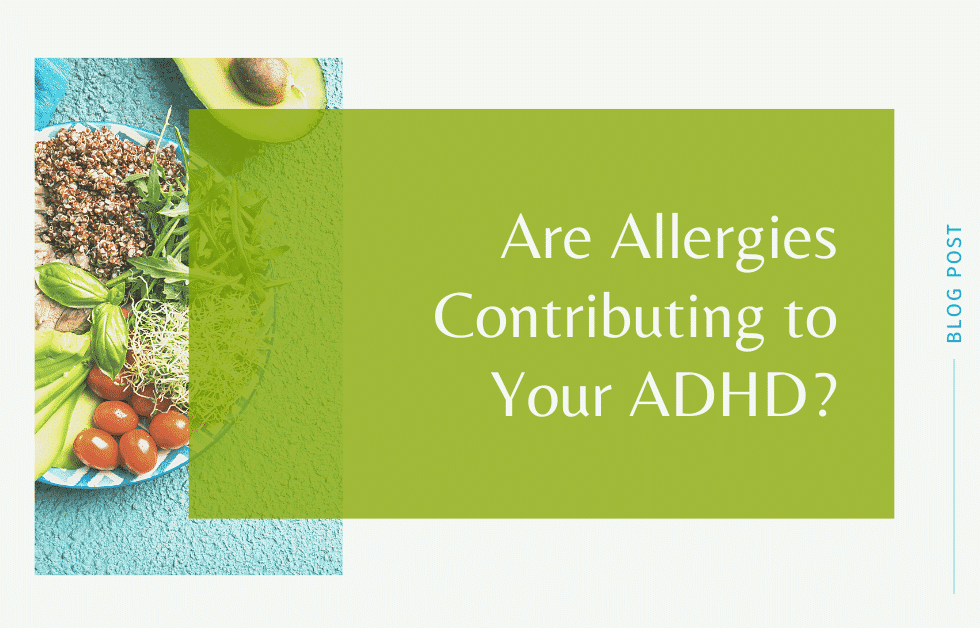Whether you or your child have problems with focus or have been diagnosed with a form of ADHD (attention-deficit/hyperactivity disorder), more than likely, there is a correlation with allergies or food sensitivities. Who would have thought we could have brain allergies? Sensitivities to food, chemicals, or inhalants can alter the chemistry of the brain. Some people may not have itchy eyes, congestion, or digestive issues due to allergies but instead have fatigue, brain fog, moodiness, or focus issues.
Below, we’ll dive into three things that may play a role in ADHD symptoms and discuss how allergy treatments can help.
1. High Histamines
Histamines, which are typically responsible for allergy symptoms, are also stimulatory neurotransmitters (brain chemicals). Our bodies naturally have histamines circulating, but when a foreign substance such as a toxin or insect bite is introduced, the body may produce large amounts of histamine.
Histamine is an important neurotransmitter that we need to help us make other neurotransmitters. When it increases, the body produces epinephrine (adrenaline) to help lower histamine. This extra epinephrine may lead to anxiety or focus issues such as ADHD.
Classical anti-histamine medicines cause drowsiness as they are blocking the influx of histamines. Histamine is not only involved in immune responses, but it also helps control energy levels, motivation, and the sleep-wake cycle. Therefore, long-term use of allergy medications may cause potential side effects such as fatigue and depression.
2. Nutritional deficiencies caused by food sensitivities or allergies
allergies
Food intolerances or sensitivities are an immune response to either immunoglobulin G (IgG) or immunoglobulin A (IgA). These responses can be delayed up to 48 hours after ingesting the food, making it hard to identify the culprit. A food allergy would be an immune response to immunoglobulin E (IgE) and is typically an immediate response.
Food sensitivities can cause inflammation in the body and affect your absorption of these foods, leading to nutritional deficiencies. One example is an egg sensitivity. If you have a sensitivity to eggs, your body can not absorb amino acids and B vitamins in eggs. Your body needs these vitamins to make the neurotransmitters needed for focus, such as GABA and Dopamine. If an imbalance occurs, ADHD symptoms could appear.
If someone has a food allergy to eggs and avoids them completely, then this can lead to deficiencies in these nutrients.
3. Food sensitivities contribute to leaky gut and disrupt the microbiome
Intestinal permeability (leaky gut) is the main cause of the development of food sensitivities, and without removing the sensitivities, leaky gut will continue. This begins a vicious cycle. Undigested food passes through the wall of the small intestine, and the body’s immune system perceives this as a foreign substance and starts to make antibodies. Once the immune response is active, each time you eat the food, inflammation will occur in the gut and can lead to an imbalance in the microbiome. Our intestinal microbiome is home to trillions of bacteria and organisms, and these tiny helpers break down food, assist in elimination, and help with neurotransmitter production.
Data now indicates that the gut microbiota also communicates with the Central Nervous System, possibly through neural, endocrine, and immune pathways, which influence brain function and behavior.¹
How can natural allergy treatments help with ADD and ADHD?
NAET® (Nambudripad’s Allergy Elimination Technique) is a gentle, non-invasive allergy treatment that uses a combination of Eastern acupressure techniques that can help alleviate allergies. When the body comes into contact with an allergen, the nervous system is the first to be triggered. The nervous system then triggers an immune response. NAET removes the nervous system response to an allergen and therefore lowers histamines and the immune system response.
A NAET treatment is 30 minutes. While holding a sample of the substance that is causing reactions, gate points are stimulated on the hands, elbows, feet, and ankles. This allows the body to “get used to” the substance that had previously been labeled as a threat. Very young children (babies and toddlers) and people with immediate allergies use a surrogate to hold the substance. After the treatment, it’s crucial to avoid the substance for 24 hours, allowing time for the allergen to clear the energetic pathways.
Advantages of NAET can include:
- Less brain fog
- More focus
- Better sleep
- Better behavior in kids
—
Interested in learning more about NAET? Check out my previous blog post, The Physics Behind NAET (Acupressure Allergy Treatment).
If you’d like to discuss ADD, ADHD, or schedule a NAET Treatment, contact us at (317) 344-9840 to schedule an appointment.
Source: 1. Nat Rev Neurosci. 2012 Oct;13(10):701-12. PMID: 22968153

